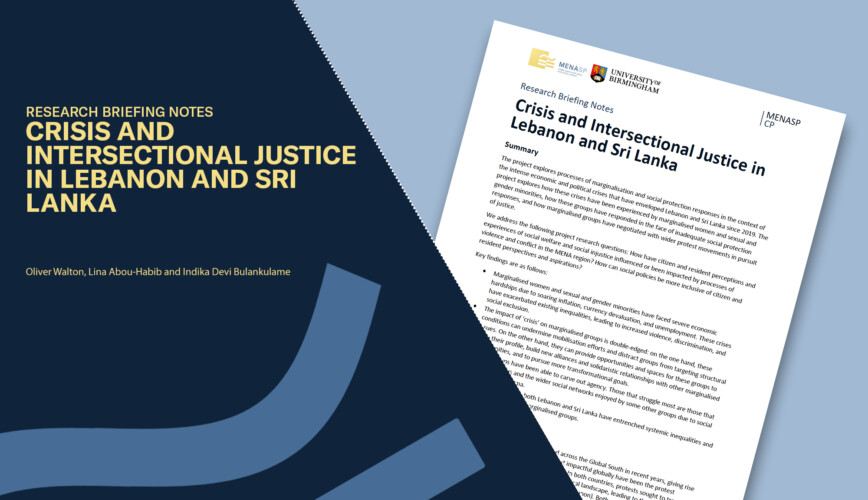The project explores processes of marginalisation and social protection responses in the context of the intense economic and political crises that have enveloped Lebanon and Sri Lanka since 2019. The project explores how these crises have been experienced by marginalised women and sexual and gender minorities, how these groups have responded in the face of inadequate social protection responses, and how marginalised groups have negotiated with wider protest movements in pursuit of justice.We address the following project research questions: How have citizen and resident perceptions and experiences of social welfare and social injustice influenced or been impacted by processes of violence and conflict in the MENA region? How can social policies be more inclusive of citizen and resident perspectives and aspirations?
Key findings are as follows:
- Marginalised women and sexual and gender minorities have faced severe economic hardships due to soaring inflation, currency devaluation, and unemployment. These crises have exacerbated existing inequalities, leading to increased violence, discrimination, and social exclusion.
- The impact of ‘crisis’ on marginalised groups is double-edged: on the one hand, these conditions can undermine mobilisation efforts and distract groups from targeting structural issues. On the other hand, they can provide opportunities and spaces for these groups to raise their profile, build new alliances and solidaristic relationships with other marginalised communities, and to pursue more transformational goals.
- Not all groups have been able to carve out agency. Those that struggle most are those that lack legal status and the wider social networks enjoyed by some other groups due to social exclusion and stigma.
- Legacies of conflict in both Lebanon and Sri Lanka have entrenched systemic inequalities and discrimination against marginalised groups.
DOI: 10.48352/uobxmenasp.0021
Authors:
Oliver Walton (University of Bath), Lina Abou-Habib (Asfari Institute, American University of Beirut) and Indika Devi Bulankulame (Centre for Poverty Analysis)
This project is supported by the Middle East and North Africa Social Policy Network (MENASP) at the University of Birmingham, in the framework of its ‘strengthening social welfare and security in the MENA region’ research programme, funded by the UK Arts and Humanities Research Council’s Global Challenges Research Fund.
Disclaimer: The opinions expressed in this publication are those of the authors. They do not purport to reflect the opinions or views of the Middle East and North Africa Social Policy (MENASP) Network or the University of Birmingham.
